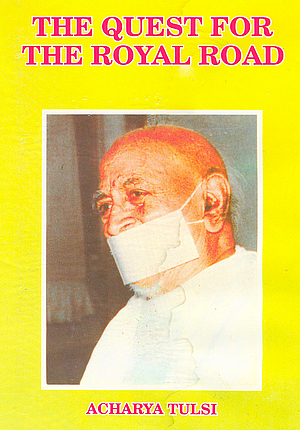The word non-violence emits a pleasant sweetness that permeates the human being in every pore. Its sweetness spreads not only to an individual but to the whole. That is the reason why people everywhere have practised it and derived benefit out of it. There is nothing surprising about religious people singing the glory of non-violence or solving their problems through non-violence. But it is certainly a matter of pleasant surprise when the people who are not directly connected with religion or non-violence talk about practising non-violence.
Gandhiji's name is the foremost among those who experimented in non-violence in the present age. He brought about a revolution in the context of Indian politics. He entered the political arena to free the country which had been under an alien rule for centuries, by the power of non-violence. The foreign rulers squeaked under the impact. They surrendered before the power of non-violence. India become free. Even today, Gandhiji's followers are deploying non-violent methods in politics. How far their experiments are guided by their faith has still remained an unanswered question. But the value of non-violence, as a matter of principle, has been accepted beyond any doubt.
The fact that attempts are being made to solve the international problems non-violently is by itself a new experiment of its kind. The voices in favour of disarmament, that are being heard in the face of the arms race, are the result of non-violent thinking. Coming together of people with opposite views in an atmosphere of harmony is possible only on the basis of non-violence. From this point of view, international organisations like the United Nations are thinking about world peace in terms of non-violence.
Non-violent means are being particularly employed today to deal with the crime situations. In ancient times, prisons used to be known as torture chambers, where the prisoners used to be subjected to terrible physical and mental tortures. That made them all the more rebellious and they got involved in more dreadful crimes even before their release. When the method of oppression did not succeed in bringing down the crimes, some people adopted the non-violent attitude. Instead of torturing the criminals, they were given some constructive work to do. Close relations on the part of the officers, healthy atmosphere and the desire to lead a respectable life led to a tremendous change in those people. Seeing the good results of it, all new researches and new experiments were in that direction. Today these people are naturally included among those who are practising non-violence.
There was a time when the social conflicts were characterised by practices like ex-communication. Feelings of terror and revenge prevailed in public life. It is not that such things are not found today. Still, some people who have faith in non-violence, are trying to resolve social conflicts by non-violent methods. Such experiments also have enhanced the power of non-violence.
The family is the smallest institution from the point of view of collective consciousness. Even members of the same family are often subjected to strong attacks on account of differences of opinion. There is conflict between the father and the son. There is estrangement between the mother and the daughter. There are reservations between two brothers. Even the husband and the wife cease to be on talking terms. In such an atmosphere of dissensions, peace is restored by the people who practise non-violence. The walls of insistence break-down and life becomes pleasant and sweet. The emerging traces of suspicion are erased and as a result, mutual trust is strengthened.
The number of people resorting to the use of non-violence in their personal lives is by no means small. Those who have cultivated spiritual attitudes and who are religious by practice and those who regard religious as a process of transforming life, have necessarily to adopt non-violent methods. The experiment, begun at the individual level, have its influence right upto international level and show the way to unrestricted joy.
Those who have practised non-violence in their own lives, it is something like being safe on an island that is never enundated. Those who live on such an island, never face any danger on account of water. They are always free from anxiety. Even the most terrible cyclones do not scare them. The power of non-violence is a million times greater. Hence, those who live under the protection of non-violence can never feel alarmed any time.
 Acharya Tulsi
Acharya Tulsi
